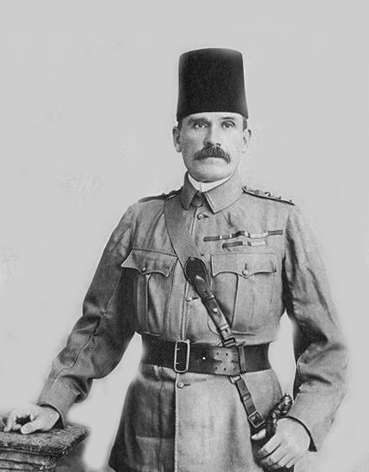Sir Hector MacDonald
Mar 4, 1853 to Mar 25, 1903

Hector MacDonald was born on a farm at Rootfield, near Dingwall, Ross-shire, Scotland to William MacDonald, a crofter and stonemason, and Ann Boyd. Hector left school and became apprenticed to a draper in Dingwall and then moved to the Royal Clan Tartan and Tweed Warehouse in Inverness. On March 7, 1870 MacDonald joined the Inverness-shire Highland Rifle Volunteers and the following year enlisted in the 92 Gordon Highlanders at Fort George in Ardersier, Highlands, Scotland. He rose rapidly through the non-commissioned ranks and received a commission in his regiment on January 7, 1880 for his distinguished conduct in the Second Afghan War, an extremely rare honor.
During the First Boer War (1880-81), MacDonald served as a junior officer and was taken prisoner at the Battle of Majuba Hill. So conspicuous was his bravery that General Joubert of the South African Republic gave him back his sword. In 1885 Macdonald took part in the Nile Expedition and served under Sir Evelyn Wood in the reorganization of the Egyptian Army. By 1888 he became a Captain in the British service but continued in Egyptian service training Sudanese troops. In 1889 he received the DSO for his actions at the Battle of Toski and in 1891 was promoted to major following the action at Tokar. During the Mahdist War, MacDonald commanded a brigade of the Egyptian Army in the Dongola Expedition (1896), subsequently distinguishing himself at Abu Hamed (1897), Atbara and Omdurman (1898). Following Omdurman Macdonald was promoted to Colonel in the British Army and appointed an aide-de-camp to Queen Victoria. In December, 1899, MacDonald was sent to South Africa to command the Highland Brigade and took part in the Paardeberg, Bloemfontein, and Pretoria operations receiving a knighthood in 1901 for his services. In 1902 following a short period commanding the South District Army in India, he was appointed Commander in Chief of British Troops in Ceylon.
His final service in Ceylon provided a sad ending to such a brilliant military career. MacDonald was involved in a scandal involving young boys and on returning to Ceylon to face a court martial, he shot himself in a Paris hotel room. Following the suicide it was learned that MacDonald had a wife and son. In 1884, he had secretly married a girl of fifteen. On June 29, 1903, a Government Commission released a report exonerating MacDonald for the court martial charges.
